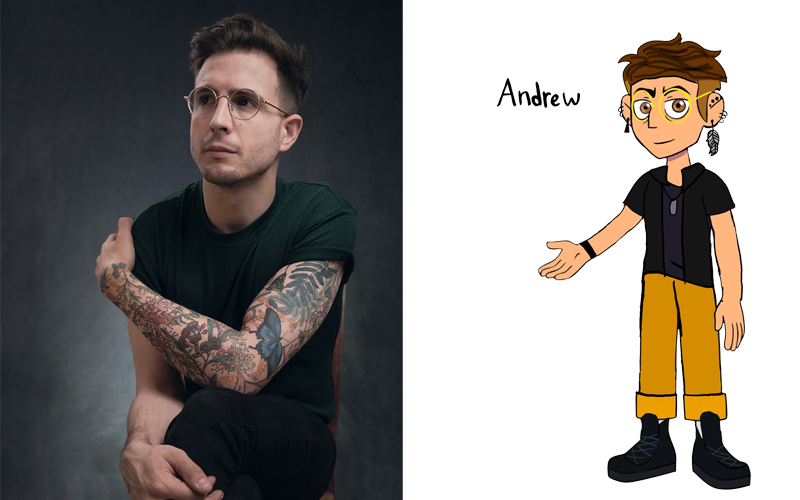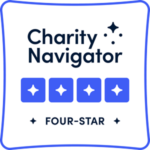Chalkboard Chats is an interview series highlighting the teaching artists who dedicate their time and expertise to ArtsConnection students.
![]()
ANDREW STRANO: Tapping Their Musical Gifts (and an occasional Oreo) to Inspire Their Students
![]()
What’s your earliest memory of being moved by art?
This is a tricky one! So many of my friends tell stories of seeing a show and thinking “I want to do that”, but for me (I grew up in rural Australia) those instances were fewer and further between. I think when a love of the arts really flourished was when I was doing it. When I was 14 or so, I was cast as one of the students – Jean Prouvaire – in a community production of Les Miserables. I fell in love with the doing, not the seeing. It felt like magic to be even a small part of that much bigger production, working with everyone else to tell a story.
What kind of music did your parents play while you were growing up… and did the apple fall far from the tree?
There’s was a long running gag where my Dad would heckle any time we had a gathering, shouting “We want ABBA! We want ABBA!” — until we bought him ABBA Gold. Mostly I remember Nina Simone, Van Morrison, The Eagles, or the Stones, but we did have a double cassette of The Phantom of the Opera that I listened to a lot in my car.
Did the Apple fall far from the tree? I think maybe, yes? I mostly listen to singer/songwriter stuff these days — Birdy, Gretta Ray, Maisie Peters, Sara Bareilles, Hozier — but singing for a piano bar for years bought me so much respect for anything that’ll get a room full of people screaming along!
Describe your primary school arts education in three words.
Fun, certainly. And passionate! But maybe… maybe limited is the word? I’m only 35, but arts education has changed so much since I was a kid, and I’m grateful for it. I feel like we’re getting much more of a handle on what’s possible, and I’m really excited by the increase in student agency we’re seeing. And I guess that we’re a part of creating!
How long have you been teaching with ArtsConnection?
About 2 years.
What has been one of the biggest challenges?
The challenges are different wherever we teach. I’d say one of the biggest was working with a school community that was experiencing some pretty profound grief, but with communication, flexibility, and so many Oreos, it was ultimately very moving to have been able to offer support to that community.
Any surprising rewards?
I mean… seeing students love the work, or forming connections with each other, or any time one of them shocks themselves by really taking a big step forward… that’s magic. I’m so grateful for the time I get to spend with students, that it does come as a shock sometimes when they express the same thing back… through a card, or a kind word, or once, a drawing of me? I’ll send it to you.
How has teaching children changed your outlook on art?
Completely. We’re all kids really — it’s just that between the ages of maybe… 15 and 75 we get a lot better at hiding it. It’s reminded me to treat myself with the same gentleness, and that’s helped me to stay open, playful and creative. They also, for real, just straight up teach you things. Which is the best ever.
Name an artist – living or dead – you’d like to have dinner with and why.
My glib answer is: “If they’re paying, then… anyone!”
But my real answer is that I recently lost a friend and mentor, and I’d honestly love another dinner with them. Or a quick cup of coffee, or a “you’re going downtown too, right?” cab ride, or even one more interrupted phone call.
Time management is hard. Any tips on managing a personal artistic practice with a teaching career?
I was going to ask you the same thing! Living in New York makes this incredibly difficult. I love teaching. And I love working as an artist. I’m grateful I get to do both things. But the cost of living here is astronomical, and the truth of the matter is that both teachers AND artists mostly don’t get paid enough. I work 13 days out of 14 at the moment, and I’m still barely scraping by — plus when I’m done with work, the last thing I want to do is more work, even if it’s creative. Worrying about rent, and scheduling, and if I constantly negotiating whether I’d rather have a personal life or a healthy sleep schedule makes it hard to stay playful!
The only secret I’ve ever found that works for me is real, external deadlines, or even better, strict deadlines AND to be paid to make the art, just as I’m paid to teach. This means I can afford to carve out the time, and to keep it sacred. Sometimes this is about grants. There are whole drafts of musicals that only exist because of grants I’ve won in the past. And I can’t be grateful enough for that.
In your own words, describe why the work we do at ArtsConnection is important.
The way I see it, there are two key skills in life: Interpreting the world and expressing yourself. The arts is the combination of both. It’s both! And the more we can equip people to have a voice, to listen to others, and to work together, the better off we all are.
![]()
PHOTO CREDIT: Flick Smith | ILLUSTRATION: Student at Liberty Middle School.



